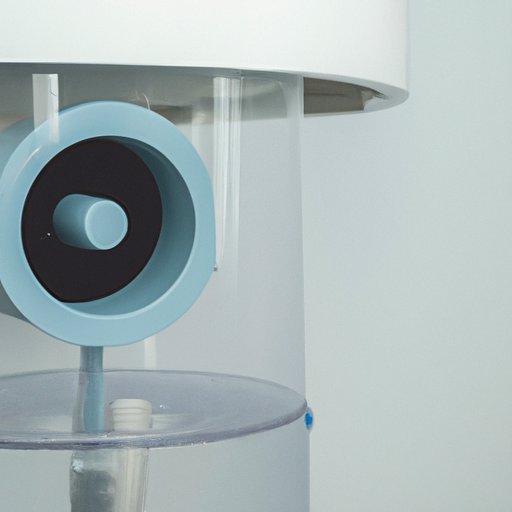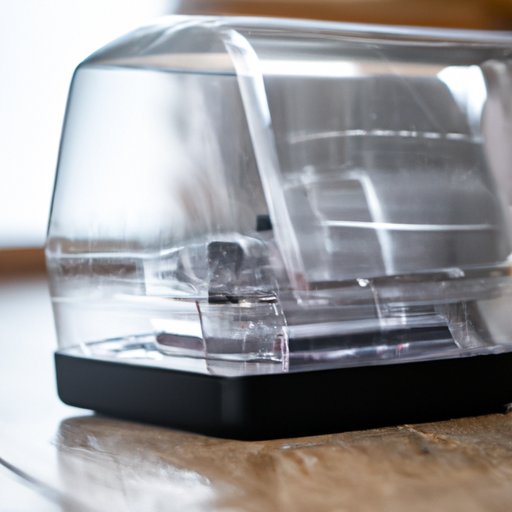
Introduction
Do you know what water you should use in your humidifier? Although tap water may seem like the most convenient option to fill it up, it may not be the healthiest choice for you or your device. In this article, we’ll explore the pros and cons of using tap water in a humidifier, the potential hazards, and the alternatives available.
To Tap or Not to Tap: The Truth About Using Tap Water in Your Humidifier
A humidifier is an appliance commonly used during the dry winter months to add moisture to the air and alleviate congestion, dry skin, and other respiratory issues. It works by releasing water vapor into the air, which increases the relative humidity levels in the room.
Tap water is the water directly supplied through the pipes to your home, which you may use for multiple purposes such as drinking, cooking, and cleaning. Although tap water is generally safe for human consumption, it may contain impurities, minerals, and other components that may impact the performance of your humidifier and pose health or environmental hazards.
According to a study made by the Environmental Protection Agency (EPA), tap water can contain up to 300 contaminants, including herbicides, pesticides, and solvents.
Why You Should Think Twice Before Filling Your Humidifier with Tap Water
While it may seem harmless to use tap water in your humidifier, it can have different harmful effects on your health and the environment. Minerals such as calcium and magnesium present in hard water can lead to white dust accumulation on your furniture and flooring, as well as damage the internal components of your device. Moreover, it may exacerbate asthma, allergies, and other respiratory conditions.
Microorganisms such as bacteria, viruses, and fungi can grow in the standing water in your humidifier and be released into the air you breathe, leading to infections and allergic reactions. Moreover, high levels of humidity can promote the growth of mold and mildew, which can cause respiratory issues and compromise the structural integrity of your home.
The Do’s and Don’ts of Using Tap Water in Your Humidifier
If you decide to use tap water in your humidifier, you should follow some best practices to minimize the risks and optimize performance. It would be best if you cleaned your humidifier regularly, disinfected it, and change the water frequently, especially if you do not use it daily. You should also avoid using hot water or boiling it, as it can disperse minerals and microorganisms into the air.
On the other hand, you should never use water from a swimming pool, spa, or other sources containing chlorine or other chemicals. It can damage your device, corrode the metal parts, or cause chemical reactions with the minerals present in the water.
The Surprising Downsides of Using Tap Water in Your Humidifier
In addition to the health and environmental hazards mentioned earlier, there are other nuisances associated with using tap water in your humidifier. For instance, mineral buildup can cause clogs and reduced efficiency of your device, leading to higher electricity bills or even malfunction. You may also experience musty odors from the bacteria or mold growing inside the tank or filters.
To mitigate these issues, you can use demineralization cartridges, filters, or vinegar to clean and purify the water. You may also consider using a humidifier with an automatic shut-off function or self-cleaning features to avoid over-humidification or mold growth.
Alternatives to Tap Water for a Healthier Home Humidity
If you are concerned about the quality of your tap water, or if you want to maximize the benefits of your humidifier, you may consider using alternatives to tap water. Distilled water, demineralized water, purified water, or reverse osmosis water are among the options available. These types of water have lower concentrations of minerals, impurities, and microorganisms, which can prolong the lifespan of your device and provide cleaner air.
However, keep in mind that these alternatives may come at a higher cost and are not necessarily the most sustainable option. Moreover, it would help if you stayed aware that some humidifiers may require a specific type of water, and using the wrong one may void the warranty or damage the equipment.

The Hidden Risks of Tap Water in Your Humidifier and How to Avoid Them
Tap water in your humidifier can present rare but severe risks, such as Legionnaires’ disease, a severe form of pneumonia caused by Legionella bacteria. Although instances of Legionnaires’ disease from a humidifier are rare, some cases have documented them, especially when the humidifier has not been adequately disinfected. Additionally, some tropical or subtropical regions risk exotic waterborne diseases that can be transmitted through tap water.
You can lower these risks by making sure to disinfect and clean your humidifier frequently, using water at room temperature, and following the manufacturer’s instructions.
From Bacteria to Minerals: Exploring the Risks of Using Tap Water in Your Humidifier
Using tap water in your humidifier can result in different risks and problems that you need to take into account before making a decision. Bacteria, viruses, fungi, and other pollutants can thrive in the warm environment of your humidifier and pose health risks to you and your family. Moreover, minerals present in hard water can clog your device, reduce its efficiency, and damage its components over time.
However, some humidifiers may require hard water to function correctly, which may make using tap water the best choice in that case. You may evaluate your options based on your needs and preferences, taking your health and the environmental impact into account.
Conclusion
In conclusion, using tap water in your humidifier can have different implications on your health, the environment, and your device. To minimize the risks, it is essential to follow the best practices, clean it regularly, and use the appropriate water source. However, if you are still unsure about using tap water, you may consider the alternatives available, such as distilled or demineralized water. Ultimately, what matters most is to prioritize your health and find the balance that best suits your needs.
If you want to read more about the topic or have any questions, you can consult the resources available from the EPA, the American Lung Association, or your humidifier manufacturer.





